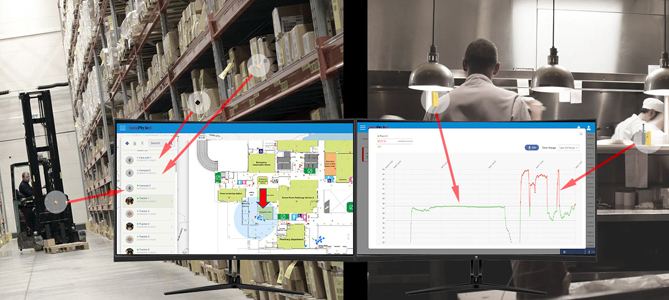Iveda platform uses Bluetooth and wifi for asset tracking
- September 14, 2020
- Steve Rogerson

Arizona-based Iveda has launched its Pinpoint platform and Bluetooth trackers and sensors for consumer and business applications.
Pinpoint uses a base station with dual-band wifi and Bluetooth capability that lets trackers and sensors be centrally managed in the cloud. This allows the tracking of objects and people in a wider area. The base stations are small USB devices that can be plugged into any electrical outlet creating a mesh network to cover an area, building, neighbourhood or entire city.
Deployment is said to be fast and easy because there are no servers or software to install. The user buys the base station, trackers and sensors; Iveda provides a cloud management platform for monthly service fee. Everything is plug and play. An unlimited quantity of trackers and sensors can be managed under one account.
“With Sid Sung our new president and our in-house expert on IoT and digital transformation, we have identified many verticals that will definitely benefit from the deployment of Iveda Pinpoint in their organisations,” said David Ly, CEO of Iveda.
One application is asset tracking in hospitals. Hospitals lose millions of dollars on mobile medical equipment because of shrinkage, rental cost and employees wasting hours looking for misplaced equipment. According to the American Hospital Association, in 2019 the number of devices per hospital bed increased to 15 and use of medical equipment averages only 42%.
Often, mobile medical devices are not where caregivers need them. Pinpoint can identify the exact location of every piece of equipment on a map with Bluetooth trackers. An alert can be sent to appropriate individuals when equipment is removed from an area or taken out of the building.
Additionally, Iveda’s TempPad sensors can be used to monitor patients’ temperatures. This eliminates nurse’s visits to patients’ rooms for temperature monitoring at all hours of the day, reducing the number of times patients need to be disturbed.
Similarly, the TempPad sensor can be employed in the private sector as part of a Covid-19 installation to thwart the spread of the virus. Workers at factories and employees at hotels can wear a small TempPad while they are on duty. An alert is sent to appropriate individuals at the organisation when a high temperature is detected. Pinpoint can show the exact location of the worker and where that worker has been, which helps in contact tracing.
It can be used by schools and parents to track children when they get on and off the school bus. Each bus can be equipped with an Iveda Pinpoint base station, using wifi or the bus driver’s mobile app for connectivity. When on school campuses, the same tracker on children may be used to check attendance.
Likewise, it can be used in theme parks for locating and retrieving missing children. Parents can rent or purchase trackers for their children as they enter the theme park. Their location is always marked on the park’s map, which parents can access on their smartphone.
“This is really personal to me,” said Ly. “Our 2011 family vacation at a theme park in California turned into a nightmare when unbeknown to us, my two-year old daughter climbed out of her stroller. We found her after an hour, but it was the longest hour of our lives. It was the most dreadful feeling a parent can have. You think the worst. If the park had a similar technology, we would have found Maemae much sooner and all our worst thoughts and sinking feelings would have been avoided.”
For a neighbourhood deployment, the cooperation of local businesses and residents is important. Typically, base stations are placed in homes and businesses to saturate the neighbourhood for coverage. When Pinpoint is deployed in a neighbourhood, residents can put trackers on their pets, young children and elderly family members.
The system can also be deployed as part of a smart city project. In countries with the worst traffic congestion, the government has to intervene to regulate the number of vehicles on roads. For instance, in the Philippines and Mexico, the government staggers vehicles allowed on busy roads based on the last digit of their licence plate. Iveda is working with the government of Egypt for integrated smart light poles, among other applications, to enable efficient traffic management and to regulate vehicle flow on different roads at different times.
Citywide deployment of Pinpoint’s base stations on smart light poles and mandating trackers on every vehicle as part of their vehicle registration process will automate the implementation of the system. These smart light poles will provide power to Pinpoint base stations throughout the city for dense coverage.
This new technology is also a part of Iveda’s offering for the world’s aging population. Technology is a crucial element in senior care where growing demand may outstrip the availability of full-time caregivers.
Since January, Iveda has been supplying Bluetooth trackers and sensors for a senior care research project funded by the National Institute on Aging, part of the National Institutes of Health, and in collaboration with the University of California, Berkeley, Psychophysiology Laboratory.
Iveda specialises in IoT platforms that offer service providers a turnkey cloud video surveillance system, smart sensors and intelligent video search technology. Iveda uses proprietary command centre, big data storage and deep-learning algorithms. The company is headquartered in Mesa, Arizona, with a subsidiary in Taiwan.




